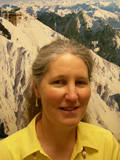The adventure behind the Holy Grail of degrees

This archived article was written by: Ashley Stilson
Once upon a time at the Eastern campus of Utah State University, there was a teacher who hungered for more than a modest master’s degree.
Thus Anne Mackiewicz, Ph.D., set out on a five-year quest for the Holy Grail of college degrees: the doctorate. Now the allotted years are complete and Mackiewicz’s tale of coursework and research comes to light.
As if a doctorate’s degree is not tricky enough to obtain while devoting full time to it, Mackiewicz achieved hers by taking a distance-education program with Utah State University.
She sacrificed every weekend and summer vacations to continue her quest for a doctorate while still working as a fulltime instructor. “You kind of give up your life for those five years where you’re writing papers on weekends and doing coursework and reading,” Mackiewicz recounts.
She realized after finishing her master’s degree that there was more she wanted to learn. “I thought there’s so much more,” Mackiewicz comments. “There was so much I didn’t know. This would be a good way to continue that education and learn more.”
But the journey for a doctorate is hazardous, as it tends to cause what Mackiewicz calls a crossover. “When you’re doing your master’s, it’s very similar to your undergrad work,” Mackiewicz explains. “But when you start to work on your doctorate, there’s this whole mind shift that takes place. If you talk to anyone who’s gotten their doctorate they will probably mention this.”
The effects of this crossover include “looking at the world in a while different format than you’ve ever been asked to do before. It makes you a much more open person to difference.”
Writing objectively is another effect of earning a doctorate. “When you get to your doctorate, you have to leave all personal opinions behind. You have to focus on what’s been done and what’s been found. From that information you can ask another question and study and find an answer for. But you have to leave your personal perspective out of it.”
Thus Mackiewicz furthered her skills on her quest for a doctorate’s degree. The quest climaxed when the hardest part of earning her degree appeared: finishing the dissertation. “[The dissertation is] the final paper you have to write. You do the research and write the paper.”
But Mackiewitcz was up to the challenge. “I would recommend getting experience first in whatever area you want to get your doctorate in because it makes it much more meaningful than just going straight from a BA to a master’s to a doctorate.”
Now that the Holy Grail of degrees has been acquired, Mackiewitcz is using it to enrich her teaching. She is ready to assist any of her students who wish to carry on the adventure for the challenging degree.
“It’s really hard to do,” she says. “But people can do it. If you’re really dedicated to doing it, you can accomplish it. I’ve found [the degree] very valuable. I’m very glad I did it.”
Thus ends the quest, with Mackiewitcz ready for many more adventures that lie on the road ahead.




